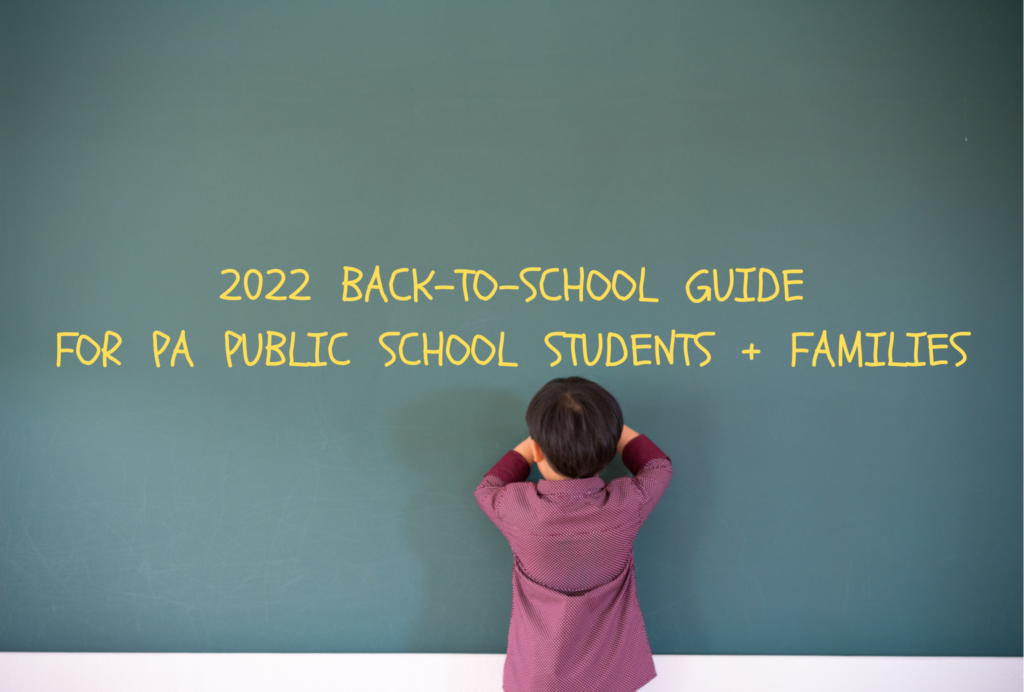
The Education Law Center (ELC) has extensively updated our annual “Back-to-School” guide with publications on multiple education topics to help families, students, and child-serving professionals.
Click on the topic to jump down to that section.
• Affirming & Safe Schools, Free from Racism
• New Law! Act 1: Access to Resources & Supports
• Advocating for Inclusive Schools and Honest Education
• Student Enrollment
• School Discipline
• Addressing Attendance Barriers (Truancy)
• Bullying & Harassment
• Students with Disabilities – IEP, 504 Plan
• Early Childhood Education
• Students Involved in Foster Care & Juvenile Justice Systems
• Students Experiencing Homelessness
• Multilingual & Immigrant Students
• LGBTQ & Non-Binary or Gender-Nonconforming Students
• Credits and Planning for Graduation
• Self-Advocacy Tools
• School Funding
If you have questions about a particular issue at your school, please call ELC’s Helpline at 215-238-6970 (Eastern and Central PA) or 412-258-2120 (Western PA).
In addition to understanding the legal rights explained in this guide, you can also visit your school district’s website for specific information about how it plans to educate and provide supports for students. Check your school’s policies to see if your children may have protections that go beyond the scope of this guide. And check back with us as we will continue to update our materials throughout the school year.
* * *
As students return to school with lingering challenges from COVID-19 and many families continue to face unprecedented hardships, students’ educational rights under state and federal law remain in full force. ELC remains committed to advancing and defending these important rights.
Our students remain deserving of equitable, affirming, and culturally responsive school spaces free from racism. Black Lives Matter!
COVID-19. Schools continue to have an obligation to keep children and staff safe from the COVID-19 pandemic. The impact of COVID-19 is still borne disproportionately by communities of color and working-class families. Parents have the right to evidence-based, clearly communicated plans for how schools plan to keep children safe during COVID. The Pennsylvania Department of Health and CDC highlight the importance of layering prevention strategies to support safe, in-person learning this school year. Based on levels of COVID-19 by county, schools should continue to utilize prevention strategies: encouraging vaccinations, staying home when sick, physical distancing, masking, testing, ventilation, handwashing. Masks are not now required by state or federal rule, but some districts or municipalities may require masking, depending on the risk of COVID spread at a given time. Schools must support anyone who chooses to wear a mask and may need to require masking in particular settings to protect students with immunocompromising conditions. Students with conditions or disabilities that increase risk for getting very sick with COVID-19 should not be segregated or separated from other students. Schools must find other ways to keep such children safe.
GUN VIOLENCE. Our students return to school in the face of continuing gun violence and attacks on schools like that in Uvalde, Texas. We mourn with those who have been harmed by gun violence. We continue to be alarmed by ill-informed responses to school shootings that result in an increase in police presence in schools or calls to make our schools look and feel more like prisons. Recent history has taught us this does not prevent horrific school shootings but leads to an uptick in arrests for low-level offenses, disproportionately impacting Black and Brown students and students with disabilities. We need effective community-based solutions to support and heal our school communities; police are not the answer. We call on schools to be inclusive, supportive, and affirming environments where our children can learn. Read our full statement here.
ATTACKS ON EQUITY & TRUTH. As champions for education justice, we continue to struggle with the reality that for too many students and families, schools can be places of deep harm and glaring racism, reinforcing systemic oppression and denying a quality education to students we strive to serve. In a nation fraying from COVID, racism, police violence, attacks on immigrants, and attacks on democracy, those inequities – and the need for supportive schools – have grown more visible.
Schools must work to be places of learning, healing, and opportunity for the students they are charged with serving. But over the past year we have seen an opposing threat: growing national and local efforts targeting Black, Brown and LGBTQ students and erasing these populations from the curriculum and programs. The proponents are working to undermine public schools by inflaming and dividing communities. We are seeing banning of books written by authors of color and LGBTQ people, banning accurate history lessons, threatening teachers with lawsuits, and forbidding the acknowledgment of LGBTQ students and families.
In this back-to-school guide and all our work, ELC urges our partners, schools, and policymakers to prioritize equity and to confront the reality and legacies of anti-Black racism, ableism informed by racism, and other systemic and intersectional inequities in schools.
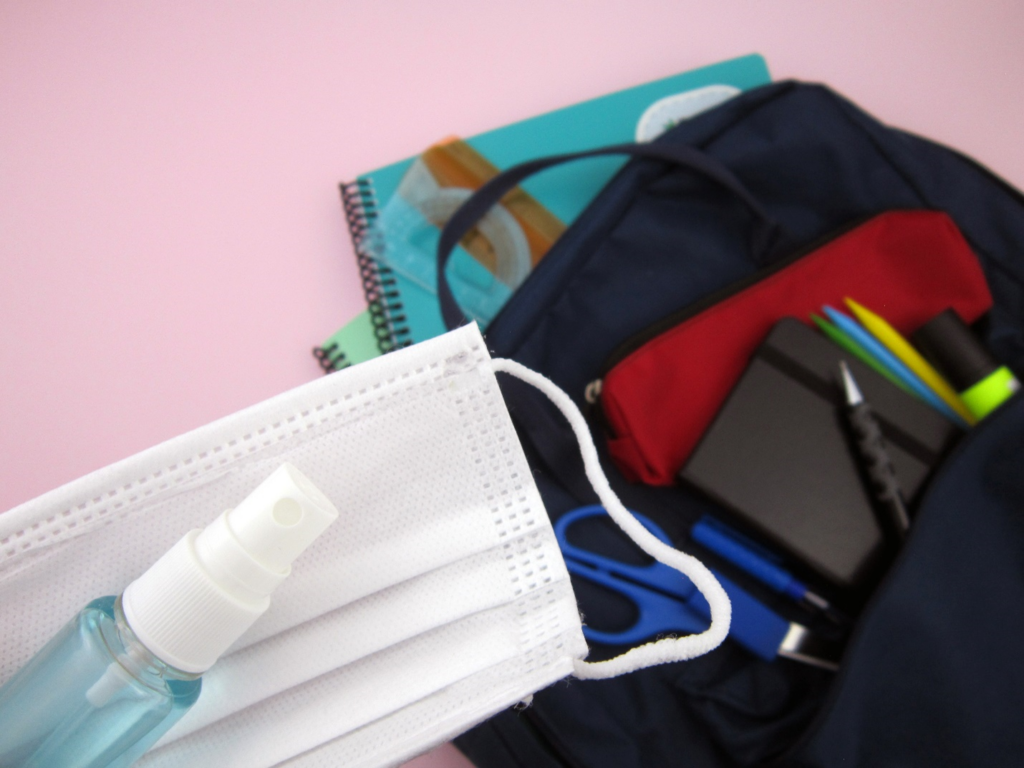
The Education Law Center-PA (ELC) is a nonprofit, legal advocacy organization with offices in Philadelphia and Pittsburgh, dedicated to ensuring that all children in Pennsylvania have access to a quality public education. Through legal representation, impact litigation, community engagement, and policy advocacy, ELC advances the rights of underserved children, including children living in poverty, children of color, children in the foster care and juvenile justice systems, children with disabilities, multilingual learners, LGBTQ students, and children experiencing homelessness.
ELC’s publications provide a general statement of the law. However, each situation is different. If you have questions about how the law applies to a particular situation, contact ELC’s Helpline for information and advice or call 215-238-6970 (Eastern and Central PA) or 412-258-2120 (Western PA) ― or contact another attorney of your choice.
AFFIRMING & SAFE SCHOOLS FREE FROM RACISM
Back-to-School Basics:
We know that schools often fail to provide equitable, safe, and affirming environments for all students, particularly students of color. Alarmingly, incidents of racial hate and abuse continue in many schools. All schools in Pennsylvania should invest in anti-racist education, develop comprehensive equity policies and practices to enable students to thrive, and ensure that responses to incidents of hate address school climate as a whole. No school community is immune from the systemic and structural racism that pervades our country and culture. Educators and administrators have a legal obligation not to stay silent and to act to confront and prevent racial discrimination, including racist harassment in schools.
Schools are legally obligated to ensure that students are not being denied opportunities, treated differently, discriminated against, or harassed because of their race, color, national origin, or immigration status. Schools must have policies and practices to prevent and address unequal treatment like discrimination and harassment. Removing police from public schools has emerged as one path forward for minimizing harm to Black and Brown students, with dozens of school districts severing ties with police or reducing police presence. More about this work is available from the Advancement Project and ACLU of Pennsylvania.
Black and Brown communities, hardest hit by the coronavirus, have also borne the brunt of school disruption, receiving diminished educational services. And students in underfunded school districts have been subjected to deplorable school building conditions. See ELC’s fact sheet on toxic schools for related information on how to remedy these conditions and ensure children of color have every opportunity to learn and grow. Explore specific investments schools can make to benefit Black girls and students of color.
What’s New?
ELC has updated our resource Promising Practices to Build Anti-Racist and Affirming School Communities with new additions to the list of concrete steps schools can take to create affirming educational environments. Check out our linked resources to learn more about the ways restorative justice practices and policies (adopted from the knowledge and cultures of some Indigenous peoples) can be used in schools, and about how to address racially biased and subjective school discipline that results in Black and Brown students being denied educational opportunities and pushed towards systems of control and incarceration. Make sure every member of the school community knows their rights and how to interrupt racism.
Some schools or districts have a policy or practice of banning parents from their child’s school building as a consequence for the parent’s alleged “threatening or unsafe behavior.” ELC is deeply concerned that Black female care givers are the most impacted by this practice due to systemic racism and bias. Parents have the right to participate in their child’s education. We are monitoring this practice and invite parents that have been excluded in this way to contact ELC’s Helpline. There is an alarming, growing backlash against recent efforts in schools to educate students about and address racial injustice, a backlash that seeks to prevent students from learning accurate history and eliminate school diversity, equity, and inclusion initiatives. In Pennsylvania, these efforts are taking the form of attacks on critical race theory, curriculum bans, book bans and more. Find more information about the harm caused by proposed and existing policies and how to engage your school and community in advancing students’ rights at ELC’s webpage on Advocating For Inclusive Schools and Honest Education.
Need Help?
- The Right to Be Free from Racism at School
- Promising Practices to Build Antiracist and Affirming School Communities
- Self-Advocacy Tool: Request for Bullying and Harassment Investigation
- Self-Advocacy Tool: Bullying and Harassment Complaint Form Checklist
- Online and Hybrid Learning: An Equity Checklist for Schools
ACT 1: SUPPORTS & RESOURCES FOR STUDENTS EXPERIENCING EDUCATIONAL DISRUPTION
Back-to-School Basics:
Act 1: Pennsylvania K-12 students who experience homelessness, involvement in the foster care or juvenile justice systems, or court-ordered placements are entitled to additional support under a new law called Act 1 of 2022. This law went into effect during the 2021-2022 school year. It seeks to remove educational and graduation barriers for students who experience one or more school changes during a single school year. Under Act 1, school entities must identify all eligible students; assign a Point of Contact for each student; ensure equal access to school, including facilitating record transfer, credit assessment, and credit recovery; and support student integration into school-based activities, including by waiving activity and late fees and allowing participation in extracurricular activities midyear.
Act 1 eligible students in grades 9-12 are entitled to receive full and partial credit for satisfactorily completed coursework, an individualized and student-specific plan, and a pathway to on-time graduation. Students can receive a diploma from their current school, a prior school they attended, or, as a last resort, a statewide Keystone diploma issued by the Pennsylvania Department of Education.
What’s New?
New guidance from PDE: On August 1, 2022, the Pennsylvania Department of Education issued new Act 1 guidance that explains important protections for students and comprehensively delineates the responsibilities of school entities to comply with Act 1. The guidance covers important topics such as a student’s right to fully participate in school activities, earn full or partial credit for work completed at prior entities, and it provides additional information about the specific obligations school entities have to 9th-12th graders to ensure they can graduate on time.
Retroactive Graduation for Students Who Should Have Graduated During the 2021-2022 School Year: Importantly, Act 1’s graduation protections apply retroactively to students who were not identified in the 2021-2022 school year but should have been identified and provided a pathway to graduate on time. Such students can request that the school entity they are currently attended, or last attended if they are not currently enrolled in school, identify a pathway to graduation. The diploma an eligible student receives will be retroactively dated back to the 2021-2022 school year.
Need Help?
- Act 1: Supporting Graduation & Equal Access for Students Experiencing Homelessness, in Foster Care, or in the Juvenile Justice System (NEW!)
- Act 1 Self-Advocacy Tool: Request for Assignment of an Act 1 Point of Contact
- Act 1 Self-Advocacy Tool: Request for Credit Assessment and Graduation Plan
- Act 1 Self-Advocacy Tool: Request to Participate in a School-Sponsored or Extracurricular Activity
- Act 1 Self-Advocacy Tool: Request to Eliminate Fines or Fees
- Act 1 Self-Advocacy Tool: Request for Act 1 Graduation Support Retroactive to School Year 2021-2022

ADVOCATING FOR INCLUSIVE SCHOOLS AND HONEST EDUCATION
Back-to-School Basics:
Every child deserves an education that prepares them for success, provides a safe place for learning, and honors their history and experiences. Welcoming and inclusive schools that provide accurate information to our children give them the freedom to pursue their dreams and prepare them to fully participate in our democracy and society.
ELC has created a new page on our website to centralize information and resources about our advocacy for inclusive schools that provide honest and accurate education. Learn more and get involved!

What’s new?
In the Pennsylvania state legislature and a growing number of school districts across the state, there are conservative efforts to undermine public schools with inflammatory accusations and fearmongering. This is a concerted reaction to recent positive movements to improve schools’ focus on racial justice and inclusive curricula. ELC is working with partners to oppose anti-history and classroom censorship bills and working with parents and students to oppose book bans and the silencing of the contributions of LGBTQ authors and authors of color – and to be in solidarity with transgender students against sports discrimination at state and local levels. Learn more on how to support these efforts on ELC’s new webpage.
Need Help?
- The School Board: Its Power and How to Advocate (NEW!)
- Your Right to Oppose Book Bans (NEW!)
- The Right to Be Free From Racism at School
- Promising Practices To Build Antiracist and Affirming Schools
- Rights of LGBTQ, Nonbinary, or Gender-Nonconforming Students
- Student Rights to Free Speech and Expression in Public Schools
STUDENT ENROLLMENT
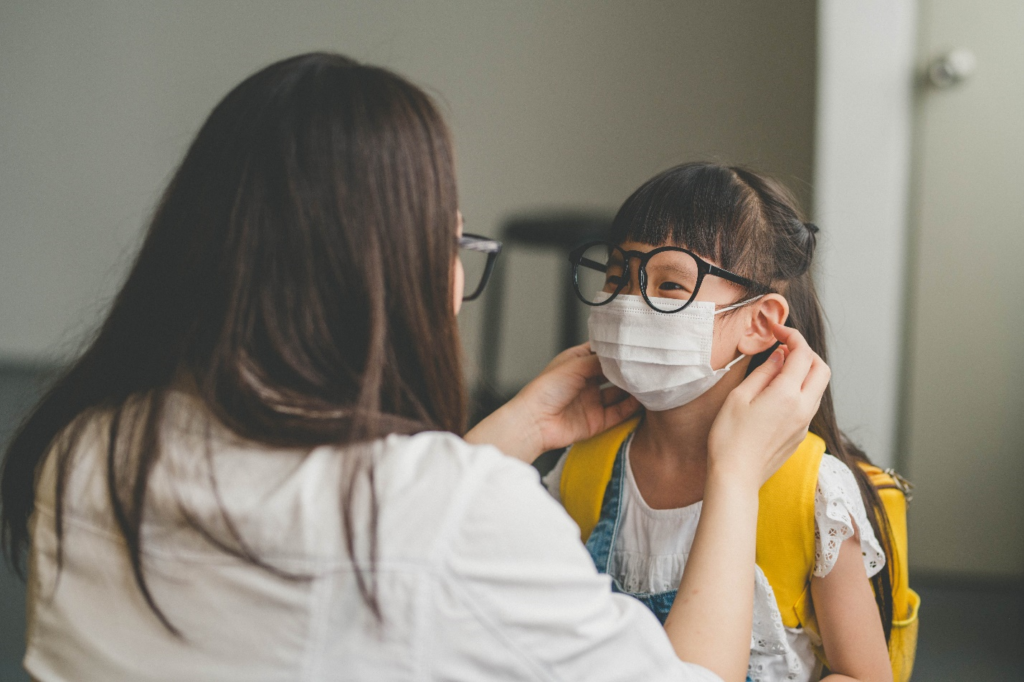
Back-to-School Basics:
Students have the right to be enrolled in school within five days of submitting only four documents: proof of the child’s age, proof of where the child lives, immunization records, and a sworn statement of disciplinary record. Schools can never ask students and caregivers about immigration status or ask for proof of immigration status. Nor can they discriminate against students in other ways regarding enrollment and school placement based on immigration status, race, color, sex, religion, disability, sexual orientation, gender identity, or a student’s status as pregnant or parenting.
Investigative reporting and ELC’s experience reveal troubling racial bias and anti-Black racism in enrollment practices. The students who are most likely to be disenrolled, suspected of residency fraud, or subjected to residency hearings are disproportionately Black and Brown students. ELC has successfully challenged such practices and seeks to uphold state guidance instructing that school districts and charter schools must be “flexible in verifying residency, and should consider what information is reasonable in light of the family’s situation.”
Schools can exclude students who are not immunized and can mark students as having unexcused absences until they are immunized or provide a documented exemption, with some limited exemptions. Students in care and students experiencing homelessness have additional enrollment protections, including around immunization. Please see our School Immunization Requirements in Pennsylvania fact sheet to learn more.
What’s New?
Act 1: This law applies to students who are experiencing homelessness, in foster care, or involved in the juvenile justice system who changed schools at least once during a single school year. The law provides alternative and expanded pathways to help students graduate on-time. To learn more, see ELC’s fact sheet on Act 1.
Act 110: This law concerns the educational placement of students who have a conviction or adjudication of sexual assault of another student who attends the same school. Parents and guardians must make certain disclosures upon their child’s enrollment. See this fact sheet for more information.
Equity in virtual learning at your home school or district: Since some schools may still be offering a virtual or remote education for some or all students, ELC has prepared a checklist as a guide to ensure that schools are serving all students equitably.
Considering a cyber charter school for your child? If you have questions about how cyber charters work, check out this webinar. Or visit the website Check Before You Choose: You will find information about teacher certification, performance ratings, supervision, and hours of instruction, and learn ways in which cyber charters differ from brick-and-mortar schools. For example, most cyber charters require a parent or guardian to serve as a learning coach for their child. For K-5, this means supervising the child’s schoolwork for an average of about five hours per day.
Cyber charter schools, like all charter schools, are public schools, required under the law to serve all students, including those with IEPs and multilingual students — but they may have limited experience doing so. To find out whether a Pennsylvania cyber charter school has experience serving English learners, click here, search for the school by name, and click on the tab labeled “School Fast Facts.” To find out how many children the cyber charter school currently serves with your child’s type of disability, click here, scroll down to the name of the school, and click on the report for the most recent year.
Need Help?
- How to Enroll a Child in Public School
- How to Enroll a Child Living with Someone Other Than Their Parent
- Rights of Multilingual Caregivers to Enroll Children in School
- Enrollment Complaint Process
- School Immunization Requirements in Pennsylvania
- Self-Advocacy Tool: Enrollment Complaint Letter
- Self-Advocacy Tool: Sworn Statement by Resident Under § 13-1302
SCHOOL DISCIPLINE
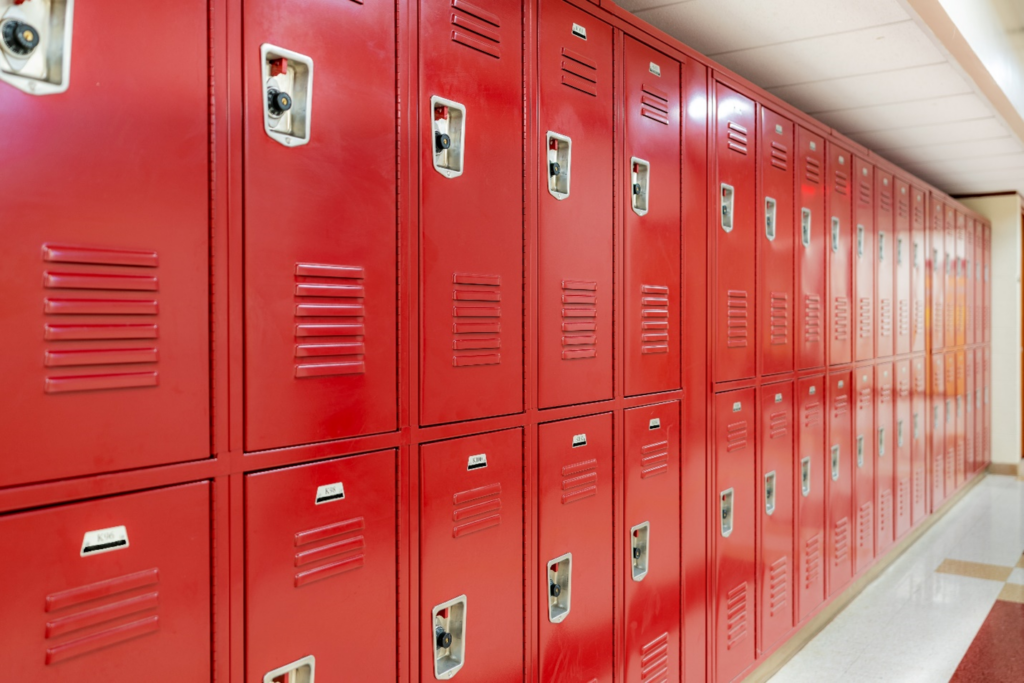
Back-to-School Basics:
Students have important rights and protections when facing exclusionary school discipline (e.g., suspension, expulsion, and disciplinary transfer). These include the right to proper notice, the right to ask questions, the right to an appropriate hearing, and in most cases, the right to receive education services in the interim and after exclusion.
The disproportionate pushout of Black and Brown students is well documented in Pennsylvania and nationally: Black students are three times as likely as white students to be suspended due to discriminatory enforcement of school discipline. As the number of suspensions has increased over time, so have racial disparities. A joint report of the U.S. Commission on Civil Rights and the U.S. Government Accountability Office explains, “Students of color as a whole, as well as by individual racial group, do not commit more disciplinable offenses than their white peers ‒ but Black students, Latino students, and [Indigenous] students in the aggregate receive substantially more school discipline than their white peers and receive harsher and longer punishments than their white peers receive for like offenses.”
Discipline may look different if your child is still learning from home through a virtual platform. If your child is excluded from the virtual classroom, you still have the rights explained in the fact sheets below.
What’s New?
Act 110: This law concerns the educational placement of students who have a conviction or adjudication of sexual assault of another student who attends the same school. Parents and guardians must make certain disclosures upon their child’s enrollment. See this fact sheet for more information.
See our Student Rights to Free Speech and Expression fact sheet for new information and examples. Generally, a school only has the authority to restrict or punish students for speech that happens at school or a school-sponsored event or on the way to or from school. A recent Supreme Court case reinforced students’ rights to expression outside of school and on social media.
Need Help?
- Suspensions in Pennsylvania
- Expulsions in Pennsylvania
- Suspension & Expulsion Tool Kit (NEW!)
- Preventing Suspension and Expulsion in Preschool Settings (NEW!)
- Alternative Education for Disruptive Youth (AEDY)
- Alternative Education for Students with Disabilities
- Act 26: Weapons at School
- Alternative Education for Multilingual Learners
- Student Rights to Free Speech and Expression
- The Rights of LGBTQ, Nonbinary, or Gender-Nonconforming Students
- The Right to Be Free From Racism at School
ADDRESSING ATTENDANCE BARRIERS (‘TRUANCY’)
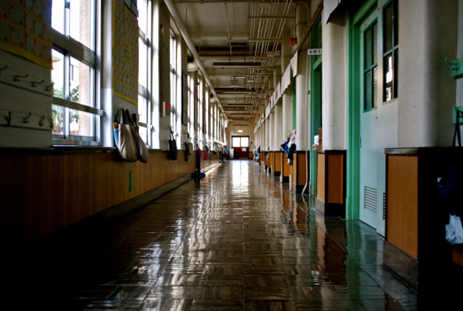
Back-to-School Basics:
As COVID-19 continues, schools are still legally required to protect students’ rights and work with families to improve school attendance and participation, regardless of whether students are learning in-person or virtually. Students’ absences should be excused if they are required to stay home from school due to COVID-19 exposure or because they have contracted COVID-19. A student’s absences should also be excused if a student is unable to attend school due to the school’s failure to provide needed transportation.
Pennsylvania requires that all students go to school from age 6 until age 18 or graduation. This period is called “compulsory school age.” Legal consequences can arise when students have unexcused absences. If a student accrues three unexcused absences, they are considered “truant” under the law. If a student has six or more unexcused absences, they are considered “habitually truant” under the law. Students have important procedural protections if they are considered to be “truant” or “habitually truant” under the law. Schools must take steps to improve attendance for students who are habitually truant, including holding attendance improvement conferences to identify and address the reason for absences.
If these steps are taken and attendance does not improve, parents and students can face serious legal consequences, including fines and jail time. While ELC disagrees with these consequences and recognizes that they cause grave harm to the families and communities we serve, the law allows schools and decision-makers to impose them.
While there is limited research regarding racial disparities in truancy involvement overall, it is well documented that punishments imposed following non-attendance are disproportionately applied to Black and Brown students. For example, Black, Asian, and Latinx students are more likely to receive a second truancy petition than white youth, and Black youth are twice as likely to be adjudicated dependent for not attending school than their white peers. Families of color are also more likely to encounter barriers to getting schools to keep accurate attendance records as is required by law. They are also more likely to come into contact with systems of child welfare and face fines, fees, and jail time as a result of disparate enforcement of compulsory school law and penalties. ELC has been involved in cases where students of color have improperly been marked as having unexcused absences and/ or have been denied legally required procedural protections under Pennsylvania’s attendance laws. Our experience also shows us that oftentimes school responses to the non-attendance of students of color are disproportionately harsher – such as imposing sanctions of jail time, swifter referrals to dependency court, referrals of youth to residential placement, and heightened police interaction with families. Importantly, the Pennsylvania Joint State Government Commission determined that “poverty and racism” caused students of color in our communities to disproportionally experience barriers to school attendance. Families should be met with supports, rather than punitive responses.
What’s New?
Schools are still required to take attendance, track student participation, and enforce compulsory school laws during the ongoing COVID-19 pandemic. Schools may still be using different policies to track attendance and participation if students are learning virtually. In addition, some schools have expanded the ways that families can submit excuse notes for absences including through text or internet-based forms. Check out your school’s website for information about how attendance will be counted this year, how you can submit timely excuse notes, what supports your child can receive if they need to miss school due to COVID-19, and what attendance policies may apply to your child depending on how they are learning.
To learn more, check out our series of Attendance Barrier Screening Tools that help families, schools, and Magisterial District Court judges ‒ the three key players in the truancy context ‒ identify and address attendance barriers while upholding the legal rights of students and families. Work to establish an open line of communication with your child’s school to make sure the school can promptly address attendance barriers and ensure that if your child does miss school for an excused reason, their absence is properly recorded as excused. If your family or your child age 15 or older has been invited to a School Attendance Improvement Conference with the school, consider completing the Family Screening Tool so that your school can identify and address attendance barriers.
Need Help?
- Addressing Attendance Barriers (‘Truancy’) & School Attendance – FAQs
- A Judge’s Guide to Attendance Barriers and Act 138
- Self-Advocacy Tools: Attendance Barriers Screeners
- Self-Advocacy Tool: Request for Attendance Record Correction
BULLYING AND HARASSMENT
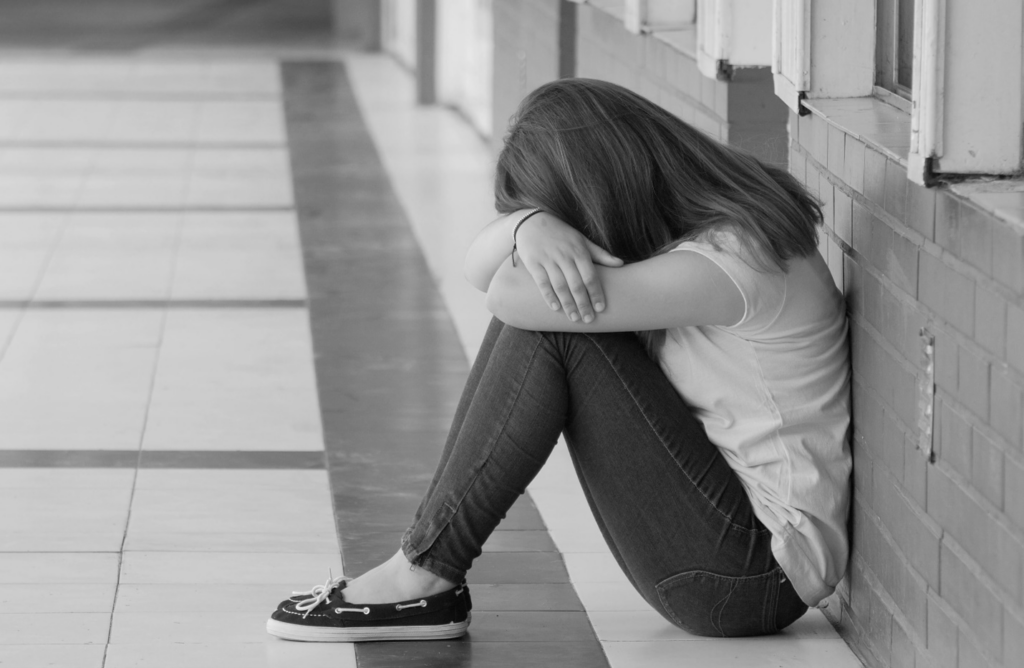
Back-to-School Basics:
Bullying and harassment are serious issues that can significantly affect a child’s ability to learn and impact a child throughout their life. All students have the right to be free from bullying and harassment in school ‒ whether it is verbal, written, graphic, physical, or online. Pennsylvania schools are required by law to have written policies against bullying and harassment and must investigate and address complaints.
Students of color, students with disabilities, and LGBTQ students are disproportionately subjected to bullying and harassment and too often disciplined for behavior that follows the bullying/harassment. Behavior may qualify as “harassment” if the offensive conduct relates to race, color, national origin/ethnicity, gender, gender identity, sexual orientation, age, disability, or religion, or any combination of these aspects of a student’s identity. If your child is experiencing bullying or harassment, keep detailed records of each incident and request in writing that the school take action.
Schools are required to intervene and correct policies or behavior that is discriminatory, including against students based on sexual orientation or gender identity. For example, if a student who is transgender, gender-nonconforming, or nonbinary identifies a chosen name and pronouns, school staff should use that name and pronoun for all interactions, written and verbal, except where required by the law to use a child’s legal name. Purposefully and persistently misgendering a student may be considered harassment under the law and therefore illegal.
Cyberbullying ‒ bullying or harassment that takes place over digital devices or the internet – is a growing problem. Studies indicate that a majority of students of color have been subjected to racially discriminatory cyberbullying, and LGBTQ students and students with disabilities are also at higher risk of experiencing cyberbullying. Schools need to provide supervision and support in the online chat programs or other communications platforms they provide for accessing instruction, just as they should be supervising and intervening in bullying or harassment that may happen in the hallway or classroom at school.
School staff must intervene to interrupt and prevent any bullying or harassment, using developmentally appropriate interventions, including if the behavior takes place in-person at school or if the school knows that a student is being bullied or harassed by another student online – including in virtual school sessions – or at any activity sponsored, supervised, or sanctioned by the school.
What’s New?
ELC has created a quick reference fact sheet explaining what parents, guardians, and students can do to address bullying and harassment. This fact sheet is currently being translated into multiple languages – check back soon for these resources.
Title IX is a federal civil rights law that prohibits sex discrimination in schools; it has been used for decades to ensure that schools respond appropriately to sexual violence and other sexual harassment in schools. In 2020, the Trump administration released harmful new Title IX rules that sought to shield harassers from consequences and prevent institutions from being held accountable for addressing and preventing sexual harassment. In June 2022, the Biden administration proposed new Title IX rules that would restore many protections. You can learn more here.
Need Help?
- What Can I Do If My Child is Bullied or Harassed? A Parent’s Guide to Advocacy in Pennsylvania Public Schools
- The Right to Be Free From Bullying and Harassment (NEW!)
- Cyberbullying
- The Right to Be Free From Racism at School
- The Rights of LGBTQ, Nonbinary, or Gender-Nonconforming Students
- Self-Advocacy Tool: Request for Bullying or Harassment Investigation
- Self-Advocacy Tool: Bullying and Harassment Complaint Form Checklist
STUDENTS WITH DISABILITIES

Individualized Education Programs (IEPs)
Back-to-School Basics:
Students who have a disability that impacts their learning have the right to a “free appropriate public education” (commonly called a FAPE), which is a planned program of education and special services that takes account of a student’s individual needs. Notably, Black and Brown students are more likely to be misidentified as needing special education, placed in more restrictive settings, denied the supports and services they need to access school, and excluded from school due to harsher discipline. In addition, although parents have the right to participate in the special education process and consent to or refuse particular services, Black and Brown parents are more likely to be excluded from meaningful participation in this process. Mounting research and lived experience demonstrate the harmful impact on student outcomes from special education resulting from this significant disproportionality in special education based on race.
Students with disabilities and their parents have robust rights to challenge decisions made by schools with which they disagree, including misidentification, restrictive placements, and harsh discipline. These rights have remained intact and continue despite school absences due to quarantine and other barriers related to the COVID-19 pandemic. Parents should be included in the creation of individualized plans for their students with disabilities to fully access learning, whether it is in-person or remote, and receive all necessary services, including related services, to address their needs.
What’s New?
As we enter another school year impacted by the COVID-19 pandemic, schools are continuing to implement measures to keep students and staff safe in school. Some students with disabilities may require modifications to these plans due to their disabilities. Parents have a right to request IEP meetings to properly plan for or respond to concerns that arise related to the intersection of health and a student’s disability.
Schools were required to determine the impact of educational disruptions resulting from the pandemic and whether each student with a disability required educational services to make up for this disruption due to the failure to make progress on IEP goals or “regression” (losing previously learned skills). In Pennsylvania, this is called Covid Compensatory Services (CCS). Each student’s IEP team should individually determine the CCS required to make up for the educational disruption. Many schools did not conduct this determination as they should have, and students have not received the required services to make up for the disruption they faced due to the pandemic. Parents who disagree with the CCS determination for their children or who did not receive notice that any determination was conducted have a right to challenge these decisions.
Follow the recommendations in the Resolving Special Education Disagreements fact sheet if you disagree with your child’s CCS determination or do not believe that any determination was made.
Need Help?
- Guide for Parents and Advocates on the Right to Special Education in Pennsylvania
- Special Education Evaluations
- Resolving Special Education Disagreements
- Your Child’s Right to Compensatory Education (NEW!)
- Self-Advocacy Tool: Request for Evaluation to Determine Eligibility for Special Education
- Self-Advocacy Tool: Request for Re-Evaluation
- Self-Advocacy Tool: Request to Convene an IEP Meeting
- Self-Advocacy Tool: Request for Independent Education Evaluation (IEE)
- Self-Advocacy Tool: Request for Mediation to Resolve Special Education Disputes
- Self-Advocacy Tool: Request for Due Process Hearing to Resolve Special Education Disputes
504 Plans
Back-to-School Basics:
If your child has a health condition, physical, mental, or behavioral impairment that “substantially limits” a “major life activity,” and if they need help to participate in or benefit from education or extracurricular programs, they may qualify for accommodations in school, called a “504 Plan.” Regardless of where your child attends school, your child’s 504 Plan should still provide accommodations and services that are necessary to access learning. Black and Brown students with qualifying disabilities often go unidentified for 504 plans and, instead of receiving necessary accommodations, are pushed out of classrooms, school programs, and entire school access.
As we enter another school year impacted by the COVID-19 pandemic, schools are continuing to implement measures to keep students and staff safe. Some students with disabilities may require modifications to these plans due to their disabilities. Parents have a right to request IEP meetings to properly plan for or respond to concerns that arise related to the intersection of health and a student’s disability.
What’s New?
The U.S. Department of Education’s Office for Civil Rights recently sought comments from families, educators, advocates, and other stakeholders on necessary improvements to ensure that Section 504 is meeting its essential goal of providing full and equal access to learning and growth for students with disabilities. ELC provided comments on how OCR should prioritize its most urgent changes, which you can read here.
Need Help?
- What Can a Parent Do If a Child Has a Health Condition that Requires Accommodations in School (Materials to request a 504 Plan)
- Your Child’s Right to Compensatory Education (NEW!)
- Self-Advocacy Tool: Request for Determination of Eligibility for a Section 504 Plan
EARLY CHILDHOOD EDUCATION

Back-to-School Basics:
Children who receive quality early education do better in kindergarten and in school
overall. However, disproportionate suspension and expulsion of Black preschool students and students with developmental disabilities greatly impacts these outcomes. Black preschool students are more than three times as likely to receive one or more out-of-school suspensions as white preschool students, due to discriminatory school discipline. No evidence exists that students of color break preschool rules more often than white children. However, evidence shows that adults punish children of color more harshly and more often than white children for the same behaviors. Children with disabilities and emotional challenges are also subject to much greater rates of preschool suspension and expulsion. Due to continued concerns about the long-term impact of preschool suspension and expulsion, the Office of Child Development and Early Learning (OCDEL) is committed to ending this practice in Pennsylvania.
Publicly funded programs such as Head Start, Early Head Start, and Pre-K Counts offer free early childcare and education programs for children from low-income families. The Early Intervention program provides additional services for children with developmental delays and disabilities at no cost to parents, regardless of income. These programs must collaborate to ensure that children are not excluded from preschools disproportionately based on the intersection of race, disability, and gender.

What’s New?
As we enter another school year impacted by the COVID-19 pandemic, preschools and childcare settings are continuing to implement measures to keep children and staff safe. However, these measures cannot be implemented with an impact that excludes children with disabilities or prevents them from accessing their early intervention services and supports. Parents should request modifications when policies or practices implemented for safety prevent young children with disabilities from accessing school programs or early intervention services.
Follow the recommendations in the Early Intervention Questions and Answers fact sheet if your child’s early learning program will not modify safety measures that are impacting your child’s education access.
Need Help?
- Early Intervention Questions and Answers
- Preventing Suspension and Expulsion in Preschool (NEW!)
- OCDEL’s Resources for Promoting Inclusion & Reducing Expulsion and Suspension
- ELC Guide to Inclusive Early Education and Early Intervention in PA
STUDENTS INVOLVED IN FOSTER CARE OR
JUVENILE JUSTICE SYSTEMS

Back-to-School Basics:
Children involved in the foster care or juvenile justice systems, like all public school students, have the right to a free public education but are more likely to receive an inferior education.
Students in foster care have additional rights to ensure their school environment is stable, despite changes in living arrangements. The right to “school stability” includes the right to remain in the same school even when youth change living placements, the right to enroll in a new school immediately without the required documents, and the right to have an active, involved education decisionmaker. Youth who are involved in the juvenile justice system may also be entitled to school stability, which is an issue that must be addressed by courts and implemented in school districts. In addition, under Act 1, a new law, students who are involved in the foster care or juvenile justice system who have had to move at least once during a single school year have additional rights to equal access to schools and support to graduate on time. Please see our section on Act 1 for more information about this important law.
Students who are placed by court order in a residential facility – including students in foster care and those who are justice-involved – are entitled to attend the local public school in the district where the facility is located unless certain exceptions apply. Youth educated in residential settings are also entitled to a quality education, and students with disabilities must receive a free appropriate public education. To that end, make sure that IEPs are updated as required by law, special education services are not disrupted, and evaluations are completed in a timely manner. If a child is not receiving a free appropriate public education, violations of law may be challenged.
The continuing trend of overrepresentation of Black and Brown youth in both the juvenile justice and dependency systems is well-documented. Such gross disparities are reflective of racial biases that operate on multiple levels throughout the child welfare, juvenile justice, and education systems. ELC is working to reduce referrals to these systems and supports efforts to address racial disproportionality.
What’s New?
Act 1 protects students who are in foster care or justice-involved who have had to change schools at least once during a single school year. The law ensures equal access to school, including extracurriculars, the elimination of certain fines and fees, and that students have a Point of Contact to support them to develop a Graduation Plan that includes an assessment of how a student will graduate on time. Please see our section above on Act 1 to learn more.
Children and youth in foster care may also need additional support and consistent follow-up. Connect with your school’s “Foster Care Point of Contact” and raise any new issues that may impact the youth, including the need for counseling and guidance to prepare for life after graduation. This Point of Contact and the Education Liaison from the county’s children and youth office can work together to address the youth’s concerns and needs, including access to support services. If you are working with a young person who has disengaged from school, talk to them about their individual situation and consider whether they need additional supports and services upon returning to school. Many students experience regression in core subjects such as math and reading, and some schools offer additional remedial assistance at no cost.
Youth in residential facilities may need a change in placement or access to the local public school. Students with disabilities have the right to request IEP team meetings to ensure they receive the supports and services needed to make meaningful progress and receive a free, appropriate public education. See our fact sheets on the rights of students in foster care and in the juvenile justice system for more.
ELC continues to advocate for the rights of students in residential placements through our class action lawsuit on behalf of students who were placed at Glen Mills Schools, where they suffered physical and emotional abuse and were deprived of their right to an education. In our case, Derrick v. Glen Mills Schools, the court upheld the right of students in the juvenile justice system to receive an appropriate and meaningful education and ordered that the lawsuit can move forward on our claims that students were harmed by a systemic and wholesale failure to provide special education services and a legally compliant general education. The complaint contains graphic descriptions that may be hard to read. The litigation is currently in the discovery stage.
Need Help?
- Rights of Students in Foster Care
- School Stability & Immediate Enrollment of Students in Foster Care
- Self-Advocacy Tool: Best Interest Determination for Children in Foster Care
- Educational Rights of Students in the Juvenile Justice System
- Toolkit for court-appointed “Educational Decision Makers” (EDMs)
Two interactive websites for practitioners seeking to improve the law and create better outcomes for children in the foster care and juvenile justice systems:
- Blueprint for Change: Education Success for Children in Foster Care
- Blueprint for Change: Education Success for Youth in the Juvenile Justice System
STUDENTS EXPERIENCING HOMELESSNESS

Back-to-School Basics:
Students in all public schools, both district and charter, who are experiencing homelessness or housing instability are entitled to school stability and immediate enrollment in school, as well as free transportation to and from school. This includes unaccompanied students experiencing homelessness on their own. A federal law called the McKinney-Vento Act provides students experiencing homelessness a robust array of protections to ensure equal access to an education, from preschool through high school.
McKinney-Vento protections do not have a time limit and remain in place until the student is no longer experiencing homelessness, even during COVID-19. McKinney-Vento eligible students have a right to school stability, with transportation provided until the end of the school year in which they secure permanent and adequate housing.
Students who are experiencing homelessness and have had a least one school change in a single school year are also entitled to additional protection under a Pennsylvania state law called Act 1.
Racial disparities in affordable housing existed long before the COVID-19 pandemic, and yet, data suggests that the pandemic and the ensuing economic fallout are widening these divides, disproportionately impacting students of color, who are already overrepresented among students experiencing homelessness. For example, the state’s most recent Homelessness Program Evaluation Report reflects that a majority of schoolchildren experiencing homelessness across the state were Black or Brown.
What’s New?
As a new school year begins, many more students will be McKinney-Vento eligible due to the enduring economic impact of COVID-19 and the current eviction crisis. Black and Brown communities continue to be the hardest hit by the pandemic and are more likely to encounter barriers to accessing permanent and adequate housing due to systemic racism. Schools have a legal obligation to identify students who are experiencing homelessness and ensure they are afforded the full protections of the McKinney-Vento Act.
Students who are experiencing homelessness and have had a least one school change in a single school year are also entitled to additional protection under Pennsylvania’s new law called Act 1, which works to eliminate barriers to full participation, creates new pathways to graduation at a student’s current school, prior school, or by meeting statewide graduation requires, and ensures students can graduate on time. Please see the section on Act 1 for details about this important law.
Universal screening is a practice recommended by the U.S. Department of Education that makes sure all students are asked about whether they have access to permanent and adequate housing, which helps eliminate stigma and makes sure eligible students are identified. ELC created this universal screen to help schools correctly identify students, in compliance with their legal obligations, and connect students to needed supports and protections. It is a best practice to screen students at the beginning of the school year and after every move.
If you are supporting a student who is McKinney-Vento eligible, please see this directory from the Pennsylvania Department of Education to connect with the person at the student’s school who will be able to support them and connect them to related resources.
Need Help?
- The Rights of Students Experiencing Homelessness
- Act 1: Supporting Graduation & Equal Access for Students Experiencing Homelessness, in Foster Care, or in the Juvenile Justice System
MULTILINGUAL STUDENTS; STUDENTS & FAMILIES FROM LINGUISTICALLY AND CULTURALLY DIVERSE COMMUNITIES

Back-to-School Basics:
Students have the right to attend school, regardless of their immigration status. Schools cannot ask about a student’s or caregiver’s immigration status and cannot require a birth certificate or Social Security number before enrolling a child in school. Students and families from linguistically and culturally diverse communities should receive language services and accommodations that allow them to participate in education regardless of English proficiency.
Students who are working to develop English language skills have the right to receive English language instruction as English learners. English learners have many special protections, including the right to learn English (with language instruction such as English as a Second Language or ESL), the right to supports, modifications, and accommodations in their core classes, and the right to be free from harassment based on their race, immigration status, or national origin. Parents whose first language is not English have the right to receive information about their child’s education in a language they understand.
For more information about the rights of immigrant, refugee, and asylee students and families, the U.S. Department of Education has a website with translated resources. Two fact sheets are available in over 10 languages on the rights of English learners to participate in educational programs and the rights of limited English proficient parents and caregivers to receive translation and interpretation for communications with school.
What’s New?
The U.S. Department of Education and the U.S. Department of Justice have jointly issued a fact sheet on “Confronting Discrimination Based on National Origin and Immigration Status,” which explains that public schools must enroll students regardless of immigration status, offer language assistance to students, and communicate educational information to families in languages they understand.
Students have the right to access culturally competent mental health services and additional educational opportunities to remediate educational disruptions from the previous school year with modifications and accommodations that remove language barriers. Information about these opportunities, and in particular programs for English learners, must be provided in multiple languages.
Need Help?
- Rights of Multilingual and Culturally Diverse Students and Families
- Rights of Multilingual Caregivers to Enroll Children in School
- The Right to be Free from Bullying and Harassment
- The Right to Be Free From Racism at School
- Self-Advocacy Tool: Request for Translation and Interpretation Services
ELC has some fact sheets translated into Spanish, Simplified Chinese, Arabic and Nepali. Call our Helpline for more info.
LGBTQ & NONBINARY OR GENDER-NONCONFORMING STUDENTS
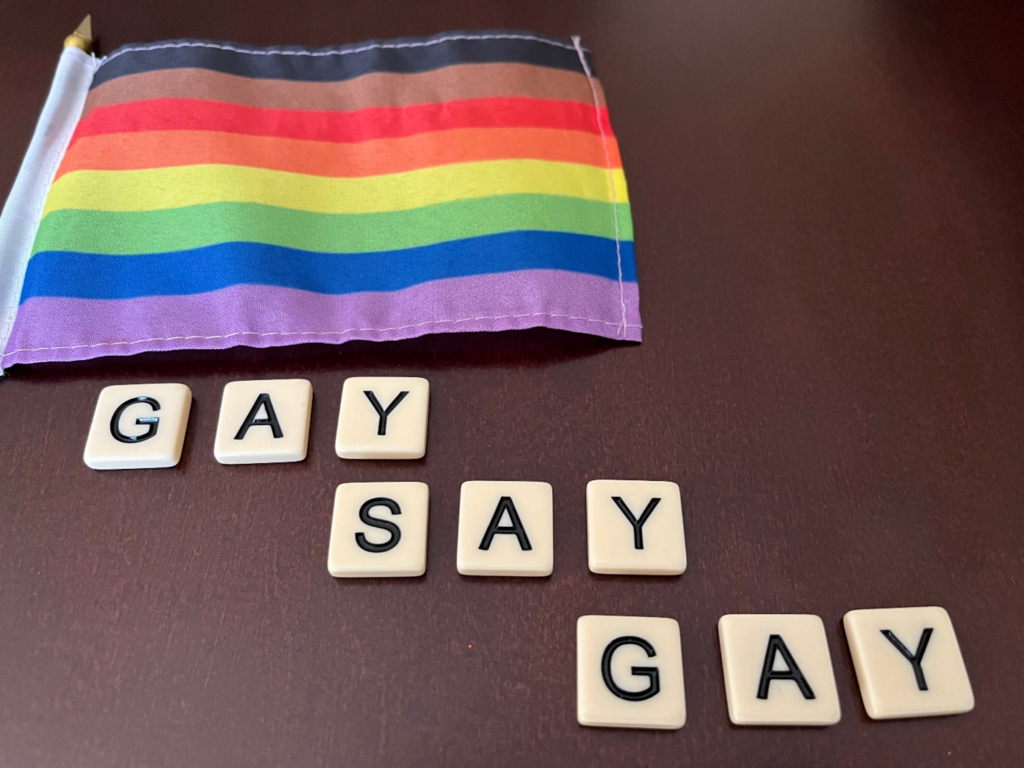
Back-to-School Basics:
LGBTQ and nonbinary or gender-nonconforming (GNC) students have the same rights as other students and have the right to be free from harassment and discrimination on the basis of their identities at school. Schools are required to intervene and correct policies or behavior that discriminates against students based on sexual orientation or gender identity. The United States Supreme Court and many federal courts, including in Pennsylvania, have consistently affirmed the rights of LGBTQ students to attend school as their true selves, free from harassment and discrimination.
Unfortunately, too often LGBTQ students still face discrimination and harassment at school from their classmates or teachers, with insufficient intervention from their schools. Black trans students often face the most harassment and disproportionate discipline. This is illegal.
If a student who is transgender, GNC, or nonbinary identifies a chosen name and pronouns, school staff should use that name and pronoun for all interactions, written and verbal, except where required by the law to use a child’s legal name. This includes providing an opportunity to correct the student’s name on any digital platforms a school is using during virtual learning (i.e., display name on Google Classroom). Purposefully and persistently misgendering a student may be harassment under the law.
What’s New?
Proposed regulations announced by the Biden-Harris administration in June 2022 make clear that Title IX will be enforced by the Department of Justice and Department of Education consistent with the Supreme Court’s holding in Bostock, which found that discrimination on the basis of gender identity is a form of sex discrimination. This means that preventing someone from participating in school programs and activities consistent with their gender identity would violate Title IX.
In recent years, anti-LGBT activists across the country, including in Pennsylvania, have introduced dozens of bills or school policies to prohibit trans students from participating in school sports on the team that aligns with their gender identity. These discriminatory policies have been successfully challenged in court. In Pennsylvania, the General Assembly passed a bill in July 2022 that would ban transgender students from participating in school sports aligned with their gender identity, but Gov. Wolf vetoed it, so that is not the law. If your school limits the way transgender students can play sports, contact the ELC and ACLU-Pa. Learn more about efforts to challenge these policies on ELC’s webpage for Inclusive Schools and Honest Education.
Need Help?
- Back to School Message for Transgender Students: You belong in our schools, from U.S. Dept. of Justice, U.S. Dept. of Education, and U.S. Dept. of Health and Human Services
- The Rights of LGBTQ, Gender-Nonconforming, & Nonbinary Students
- ELC Letter Opposing HB 972 Transgender Sports Discrimination
- ELC Letter Opposing Hempfield School District Transgender Sports Discrimination
CREDITS AND PLANNING FOR GRADUATION

Back-to-School Basics:
New graduation requirements: Students graduating in 2023are the first tohave five alternative pathways for meeting new statewide high school graduation requirements. Two pathways require proficiency on the Keystone exams. Three pathways require passing grades on the courses associated with each Keystone exam plus alternative assessments like the SAT or AP exams; occupational assessments like the NOCTI; or evidence of career readiness like industry credentials, college acceptance, internships and guaranteed full-time employment. Learn more in ELC’s fact sheet, including about waivers and factors for students with disabilities and English learners.
Students with disabilities are entitled to transition planning for life after school: All students with a disability are entitled to transition planning to build skills that help toward opportunities in adult life, including higher education, employment, independent living, and community participation. This must start by the time a child turns 14 years old and continue building skills and assessing goals each year until graduation or age 21. Students must be involved in their transition planning. Read more in ELC’s parent guide to Special Education in Pennsylvania.
What’s New?
Supports for students who experience “education instability” – Pennsylvania students who experience homelessness, involvement in the foster care or juvenile justice systems, or court-ordered placements are entitled to additional support under a new law called Act 1 of 2022. This law seeks to remove educational and graduation barriers for students who experience one or more school changes during a single school year. These students are often unable to fully participate in school and graduate on time due to lost or unrecognized credits or a student’s inability to take a course required by their last school. Under Act 1, school entities must identify all eligible students, assign a Point of Contact for each student, adopt clear policies and practices to apply full and partial credit for satisfactorily completed coursework, develop a graduation plan for all eligible students grades 9-12, and work to identify a path to on-time graduation. Importantly, Act 1’s graduation protections apply retroactively to students who were not identified in the 2021-2022 school year but should have been identified and provided a pathway to graduate on time.
Need Help?
- Graduation Requirements in Pennsylvania
- Act 1: Supporting Graduation & Equal Access for Students Experiencing Homelessness, in Foster Care, or in the Juvenile Justice System
- View a recorded webinar on implementing Act 1 co-produced by ELC and Juvenile Law Center
- PA Department of Education guidance on Act 1
- Act 1 Self-Advocacy Tool: Request for Assignment of an Act 1 Point of Contact
- Act 1 Self-Advocacy Tool: Request for Credit Assessment and Graduation Plan
- Act 1 Self-Advocacy Tool: Request to Participate in a School-Sponsored or Extracurricular Activity
- Act 1 Self-Advocacy Tool: Request to Eliminate Fines or Fees
- Act 1 Self-Advocacy Tool: Request for Act 1 Graduation Support Retroactive to the School Year 2021-2022
- Developing an IEP Transition Plan
SELF-ADVOCACY TOOLS
ELC created a series of fillable self-advocacy tools for parents, guardians, educational decision makers (EDM), surrogate parents, and advocates to address some of the most common barriers to school success that students encounter. You will find them referenced in the sections above. Each tool is free to use; most are fillable forms.
To learn more about specific education rights students have across a variety of topic areas, please review the sections above and see the fact sheet section of our website.
Need Help?
Enrollment
- Self-Advocacy Tool: Enrollment Complaint Letter
- Self-Advocacy Tool: Sworn Statement by Resident Under § 13-1302
Attendance
- Self-Advocacy Tool: Family Needs Self-Assessment to Address Attendance Barriers
- Self-Advocacy Tool: School Attendance Barriers and McKinney-Vento Screener
- Self-Advocacy Tool: MDJ Screener to Address Truancy Referrals
- Self-Advocacy Tool: Request for Attendance Record Correction
Special Education
- Self-Advocacy Tool: Request for Determination of Eligibility for a §504 Plan
- Self-Advocacy Tool: Request for Evaluation to Determine Eligibility for Special Education
- Self-Advocacy Tool: Request for Re-Evaluation
- Self-Advocacy Tool: Request for an Independent Educational Evaluation (IEE)
- Self-Advocacy Tool: Request to Convene an IEP Meeting
- Self-Advocacy Tool: Request for Mediation to Resolve Special Education Disputes
- Self-Advocacy Tool: Request for Due Process Hearing to Resolve Special Education Disputes
Multilingual Students and Families
McKinney-Vento Eligible Students (Students Experiencing Homelessness)
Students in Care
Addressing Bullying/Harassment
- Self-Advocacy Tool: Request for Bullying/Harassment Investigation
- Self-Advocacy Tool: Bullying and Harassment Complaint Form Checklist
Act 1 (NEW!)
- Self-Advocacy Tool: Request for Assignment of an Act 1 Point of Contact
- Self-Advocacy Tool: Request for Credit Assessment and Graduation Plan
- Self-Advocacy Tool: Request to Participate in a School-Sponsored or Extracurricular Activity
- Self-Advocacy Tool: Request to Eliminate Fines or Fees
- Act 1 Self-Advocacy Tool: Request for Act 1 Graduation Support Retroactive to the School-Year 2021-2022
SCHOOL FUNDING
Finally, for everyone involved with public education in Pennsylvania, one of our continuing back-to-school priorities must be to address the state’s inadequate and unfair funding of schools. While districts received funding increases this year, still far too many children are returning to Pennsylvania schools that are lacking in resources and student supports.
Please participate in the statewide PA Schools Work campaign for adequate and equitable funding and follow ELC on Facebook and Twitter. Our Fund Our Schools PA website provides updates on our historic fair funding lawsuit against the state for failure to fund public education under the state Constitution; a ruling could come later this year!
